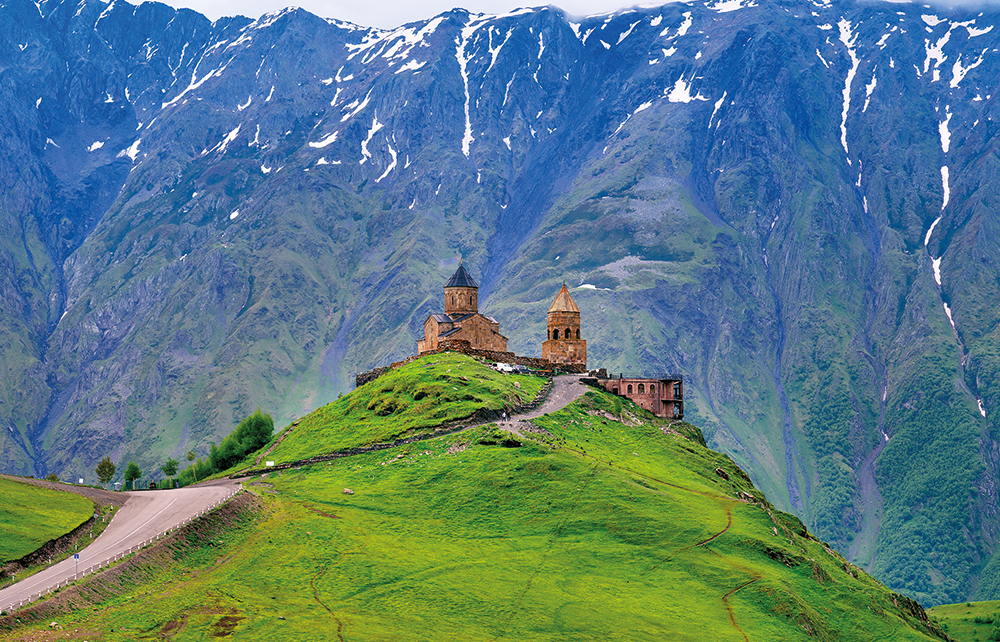It takes a brave writer, even in an age transfixed by the workings of our inner woo, to bare their soul on the page. Tom Parfitt, a former Moscow correspondent, was scarred by the horrifying Beslan school siege and massacre which he saw unfold in North Ossetia in 2004. For years he was haunted by a recurring dream of ‘endless purgatory’ in which a grief-stricken woman, who has just learnt that her child has been killed in the terrorist attack, falls through the air, groaning like a wounded animal.
There are scrapes and scares – how could there not be? Wolves, bears and dogs are regular worries
An outdoors type who enjoyed a bucolic childhood on a Norfolk farm, Parfitt yearns to free himself from the hack’s daily shackles. He comes to believe a long walk will be an essential act of healing and understanding. Not just any old long walk, but a 1,000-mile traverse of the Caucasus, west to east, through a patchwork of small, turbulent republics on Russia’s southern fringe, from the Black Sea to the Caspian. For many, probably most, readers, these mountain-garlanded statelets of Karachay-Cherkessia, Kabardino-Balkaria, North Ossetia, Ingushetia, Chechnya and Dagestan will be terra incognita.
Off he goes from Sukhum – a latter-day Paddy Leigh Fermor with a prose style I suspect the doyen of travel writers would have admired. There are scrapes and scares – and how could there not be? Wolves, bears and dogs are regular worries during the first few weeks. It is 2008, and tensions are running high. The Russo-Georgian war unhelpfully breaks out, pitting Georgia against South Ossetia and Abkhazia. Tramping through the mountains, Parfitt is accused of being a spy and is briefly detained a couple of times.
He does a nice line in humour. Modest, self-deprecating and highly attuned to his surroundings, he is not afraid to mock his own very British reactions. Although he sympathises with what the Abkhazians have been through, caught between Georgia and Russia, their unreliable imperial protector, he tires of ‘the endless rehashing of past wrongs’ while sitting among a group of beer-drinking whingers. Surveying the scruffy beach in front of them, he hears a shrill voice inside his head saying ‘a British NCO would get that sorted out in three days!’
Much later, on his way to Gimry, the onetime mountain redoubt of Imam Shamil, the leader of the North Caucasian resistance to imperial Russia in the 1800s, he gets talking to a twitchy village policeman:
‘We don’t get many foreigners around here,’ he said, pouring more tea. ‘There was a Czech a few years ago.’
‘How did he get on?’
‘Someone shot him and stole his car. They found his body in the river down by Chirkata.’
Parfitt’s writerly turns of phrase delight. Even amid the personal trauma of returning to the school at Beslan he manages to summon up beauty from appalling violence. The school corridor is a delicate shade of blue, ‘blotched with dark craters of gunfire, like the pattern on guillemot eggs’. Plums are ‘little bombs of sweetness’. Rather than attacking him, a group of sleeping roadside dogs stay ‘tightly coiled in the chill of the morning’.
Wherever he goes, he is alive to the thread of history coursing through the region. He writes of the Caucasus as a place of exile from ancient times. Prometheus was pinned to a rock on Mount Kazbek, condemned to having his liver pecked daily by an eagle before his rescue by Hercules. Pushkin was exiled there for his subversive writings but found liberation from the salons of St Petersburg in the mountains. To Prometheus and Pushkin we might add Parfitt to complete an alliterative trio of those who have found some respite or redemption in the Caucasus, ‘a chain of wonder… the frosty palisade of the mountains: vast, sparkling, immutable’.
He is also very good on Russia’s series of imperial aggressions, which of course continue to this day. He writes movingly about the Caucasian war of 1817-64, centred on Russia’s Circassian genocide, which accounted for as many as 1.2 million victims, depopulated an entire region and created ‘an Arcadia born in terror’. He talks to Chechen and Ingush families who survived Stalin and Beria’s savage deportations of 1943-44; and he draws an important connection between Russia’s brutal war against the breakaway Muslim republic of Chechnya in the 1990s and 2000s and its unprovoked invasion of Ukraine last year. In both cases, Moscow demonstrated its ‘nauseating readiness to resort to civilian slaughter and to wilfully distort the truth’. North Caucasians were seen as primitives in need of subduing; Ukrainians were Nazis and fascists.
High Caucasus is a work of extraordinary imaginative empathy and power. Parfitt has an enviable combination of language and journalistic skills, together with an open heart and a willingness to talk to everyone along the way, from shepherds and village headmen to teachers and policemen. He is a story-extracting machine, revelling in, and paying tribute to, the time-honoured traditions of hospitality that lighten his path. To quote that old expression of St Augustine, and a Leigh Fermor favourite, solviturambulando. It is solved by walking.






Comments